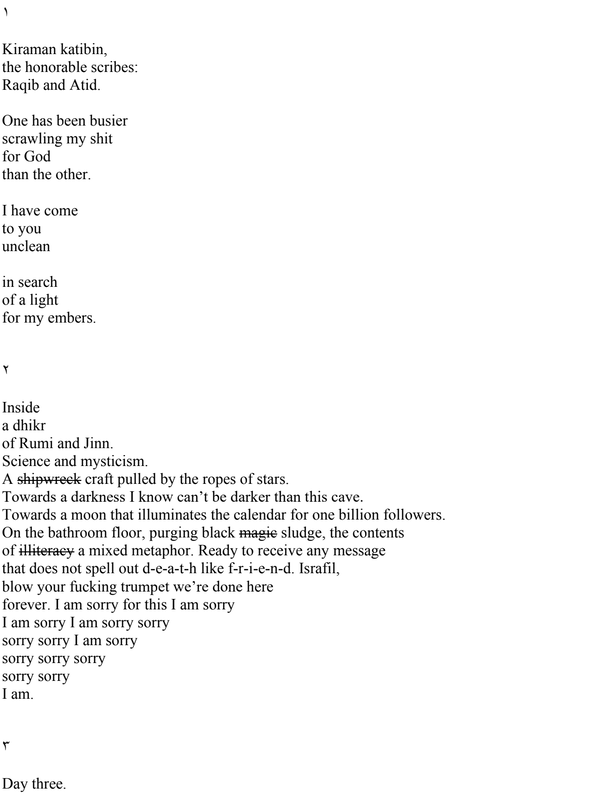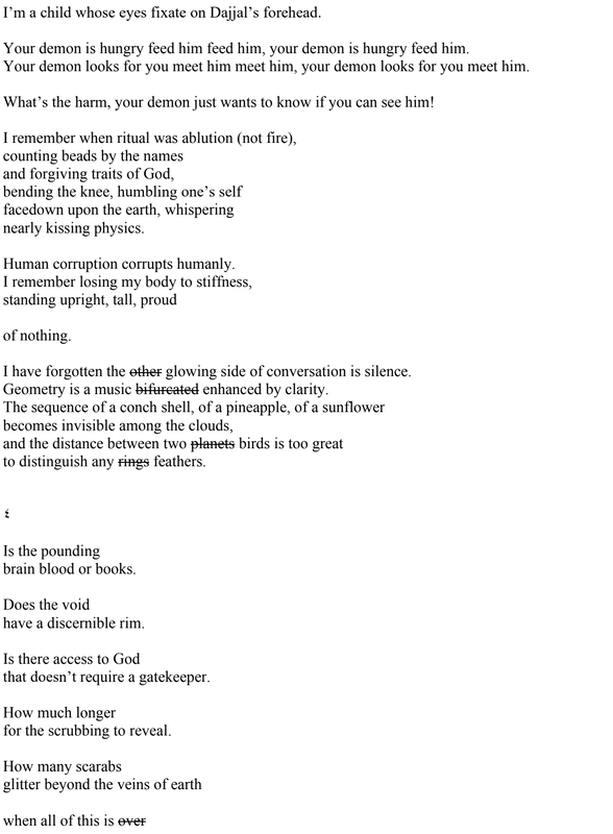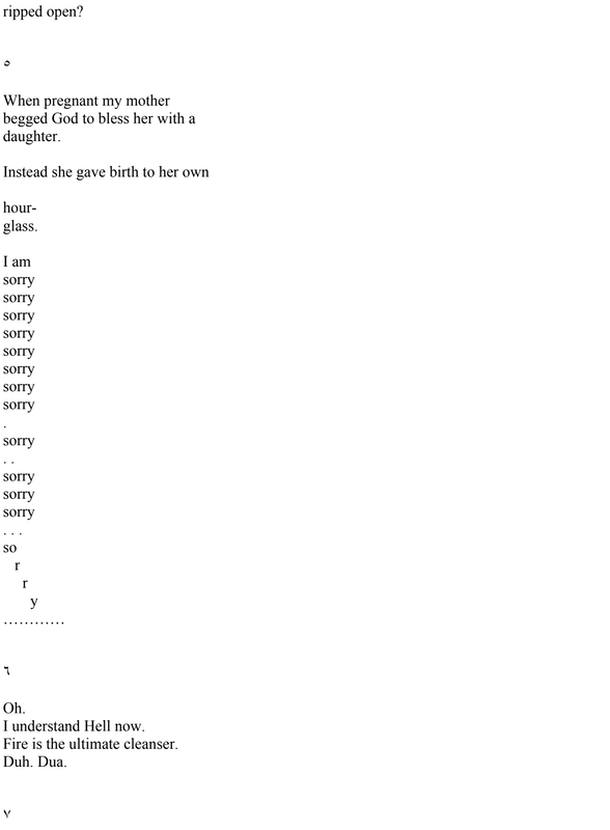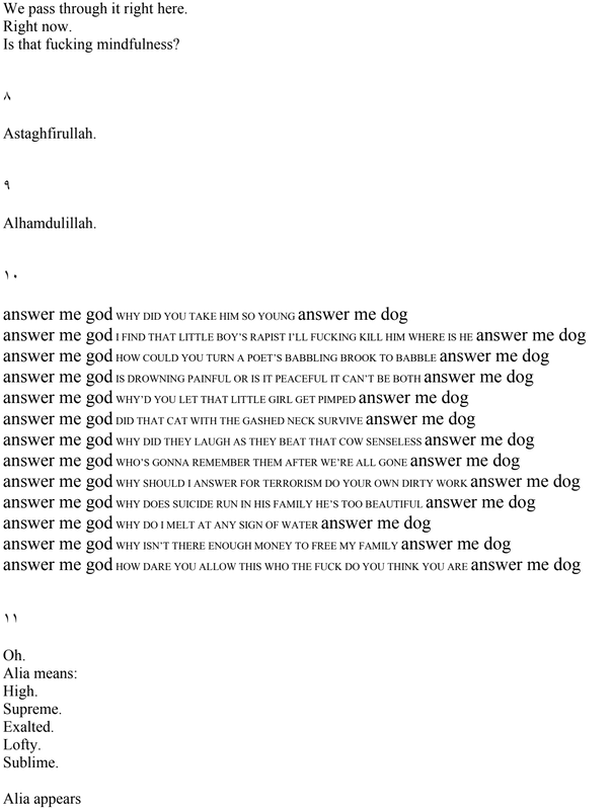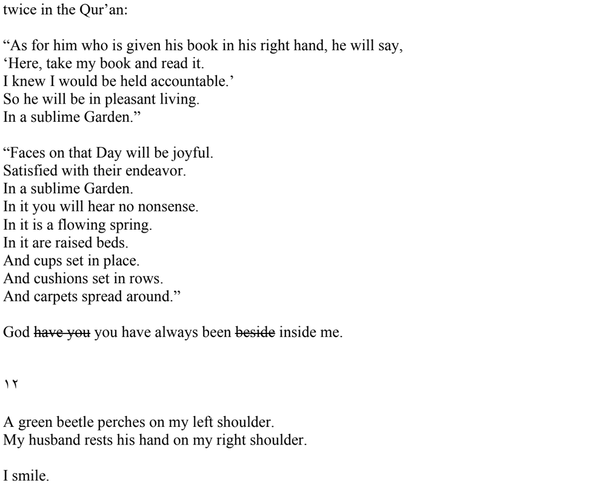by Juliette Hagobian
Juliette Hagobian (she/her) is an eighteen-year-old poet and writer from Los Angeles, California. She has been published or is forthcoming in Filter Coffee Zine, h-pem, Corporeal, and The Howl. She works as a poetry/prose editor for Kalopsia Literary. Juliette is a 2023 poetry mentee of the Adroit Journal’s Summer Mentorship Program. She loves fruit-flavored gum and will beat you in a game of Just Dance. Find her on Twitter as @jjules_h.
0 Comments
by Alia Hussain VancrownAlia Hussain Vancrown is a poet, writer, and editor. Her poetry has appeared in RHINO Poetry, Palette Poetry, Court Green, and elsewhere. Her work has been nominated for the Pushcart Prize and Best of the Net. Alia has a bachelor’s degree in Creative Writing and English with a concentration in Poetry from Southern New Hampshire University. She resides with her husband in Montgomery Village, Maryland. aliahussainvancrown.com
by Cathleen Balid
***
***
***
***
Cathleen Balid is a writer from Queens, New York. Her work is published or forthcoming in the Roanoke Review, Querencia Press, and Chasing Shadows Magazine. In her free time, she loves to journal, go on boba drives, and cuddle with her dog.
by Jonny Teklit
Jonny Teklit is a recipient of the 2019 Aliki Perroti and Seth Young Most Promising Young Poet Award. His work has appeared in The Atlantic, The New Yorker, The Adroit Journal, Catapult, and elsewhere. He is currently an MFA candidate at the University of Wisconsin-Madison.
by Ron Riekki
Ron Riekki is a poet/writer/editor from Florida and has been published by several publications such as Juked, The Threepenny Review, Wigleaf, Akashic Books, Beloit Poetry Journal, Spillway, Rattle, and many more. His books include U.P. (Ghost Road Press), Posttraumatic (Hoot ‘n’ Waddle), and My Ancestors are Reindeer Herders and I Am Melting in Extinction (Loyola University Maryland’s Apprentice House Press). Right now, he’s listening to Mireille Mathieu’s “Addio.”
by Katie Tian
Katie Tian is a sixteen-year-old Chinese-American writer from New York. Her work is published in Frontier Poetry, Polyphony Lit, Rising Phoenix Review, and Kissing Dynamite, among others. She has been recognized by Hollins University, Smith College, the Adelphi Quill Awards, and the Alliance for Young Artists & Writers. Apart from writing, she enjoys collecting stuffed animals and consuming obscene amounts of peanut butter straight from the jar.
by Spencer SilverthorneOpus 23 - Dustin O'Halloran Dustin O’Halloran is an American pianist and composer with five acclaimed solo albums under his own name. He released his first EP Sundoor with renowned classical musical label Deutsche Grammophon in 2019, and followed that up with his solo album Silfur in 2021. He’s also a member of the band A Winged Victory for the Sullen with Adam Wiltzie, and they released their album The Undivided Five with Ninja Tune in 2019 and self-released their latest album Invisible Cities in 2021.
LOVER 1 What’s been whipped after years of neglect.
LOVER 1 You had to catastrophize the measure of time. LOVER 2 Friend, your candidacy is no longer under consideration. LOVER 1 O Friend, your cadence tracked in mud from a stomp in the woods.
LOVER 2 So, watch for the water moccasin. LOVER 1 Everyone wants a problem if it means new tennis shoes.
LOVER 2 Never be someone’s passing wonder.
LOVER 1 ...with hopes that the blame’s set for your natural comeuppance. Spencer Silverthorne (he/him) is a poet and PhD candidate in English and Creative Writing at the University of Louisiana at Lafayette. He's also the Poetry Editor at Rougarou: A Journal of Arts and Literature. His work has been published in Black Warrior Review, Dream Pop Journal, Gigantic Sequins, Sundog Lit, and Westchester Review, among others. Currently he is working on a full-length collection of poetry called Deep in the Pitch of Elsewhere.
By Jacqueline XiongProse Runner Up of the Inaugural Surging Tide Summer Contest Selected by Angie Sijun Lou 十年後,邊聽著張國榮邊分手 After Enshia Li
Jacqueline Xiong is a Chinese-American writer from Houston. Her fiction has been nationally recognized by the Scholastic Art and Writing Awards and can be found in Waxwing Journal, Sine Theta Magazine, and elsewhere. She enjoys composing music, putting together Spotify playlists, and tweeting chaotically at @jacquelanx.
By Ariana DuckettWith lyrics incorporated from "Dayglow" by Fuzzybrain
Ariana Duckett is a British-born writer and editor studying creative writing in Southern California. She has been published in Lunch Ticket, Rainbow Poems, and Manuscription Magazine, was a poetry editor for Wingless Dreamer Publisher and is a current staff writer for Fulminare Review. Her other interests include astronomy, listening to music and ice skating.
By Daniel Liu Prose Winner of the Inaugural Surging Tide Summer Contest Selected by Angie Sijun Lou
Daniel Liu is an American writer. The author of COMRADE (fifth wheel press 2022), his work appears in The Adroit Journal and Diode. He has received awards from the Pulitzer Center, YoungArts, the Alliance for Young Artists and Writers, Columbia College Chicago, Bennington College, the Adroit Prizes for Poetry and Prose, and others. You can find his work at daniel-liu.carrd.co
|
